| Hout Bay YC, October 2006
Within the various yacht clubs of the cape, is an
established specialist association, named ‘The
Traditional Boat Association’, this is a voyage
of a members yacht and family, from Cape Town to Salvador,
Brazil and on to Devils Island, French Guiana, ending
up in Venezuela and Trinidad.
The aim of the TBA (traditional Boat Association)
is to uphold interest in things boating connected
with tradition, this may not always be actual boats
but more about things and places connected with them.
Around 1988 the family McBride set sail for places
west of Cape Town, the girls actually flew across
to Salvador, Brazil and Roy and three good friends
John Holmes, Alec Notman (notty) and his daughter
Simone (sam) sailed the Endurance 37,’Ocean
Cloud; across to Brazil. Visiting St Helena (18 days)
Ascension (5 days) and Salvador (11 days) apart from
a rather slow first section, the sailing was just
brilliant blue water sailing the way its supposed
to be (we have a VHS Video and a DVD)
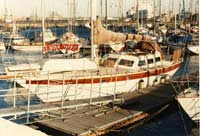 |
Ocean Cloud
Royal Cape Yacht Club, with a prime mooring
in front of the main club house.
|
Sailing with all canvas set; Main, Geneker and a
Spinnaker Staysail, we stayed our first night out
on anchor at Dassen Isle to recoupe from the weeks
of preparation for the trip. We were off early the
next day only to find a light North Wester, which
was to last a whole week. Beating into this often
required the motor but as evening fell, the wind would
increase and we would sail without the help of the
diesel engine.
| John Holmes, stowing
halyards after raising light wind sails |
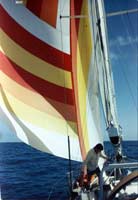
|
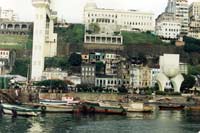 |
Salvador, Bahia,
an historic sea port that seems to have hardly
changed in decades, the old city is as it was
for centuries, with a new one built higher up
the hill. |
After a period of rest and discovery in Salvador,
which is much to be recommended if not a bit of a
culture shock. We took off north, stopping at places
like Maceio then a short trip further north to Cabadelo,
the main port for the city of Joao Pesoa; once connected
to the sea itself but a massive flood silted up its
river. Staying some while on our own anchor, a minor
refit took place. The assistance of Brian Stevens,
the British owner of Cabedelo Nautica, always ready
to source materials and equipment to assist the visiting
cruisers. I made a suggestion that as the river had
no haul out site for the larger boats ,we could collectively
build a drying out stage? Brian soon made that happen
and Ocean Cloud was the first boat alongside to take
advantage of the rivers tide rise and fall, around
2 meters sees the keel completely dry out, making
a new antifoul job easy.
After more than enough weeks at anchor and the new
paint job, we then headed offshore some to Fernando
de Noronha, which is a marine national park known
for its schools of Tumbler Dolphins. After a few days
there we went straight down wind to another Brazilian
Isle, Rocas,
| Janet and Jean sailing
to one of the bays in Fernado do Noronha. |
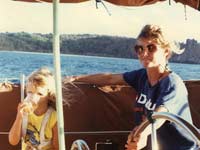
|
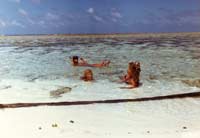 |
Swimming in
the Rocas lagoon. Roy, Janet and Lorna |
We enjoy our trip ashore, swimming in the shallows
and watching the shoals of bright tropical fish. This
may be one of the few islands in the South Atlantic
(just) that is actually coral. The British Admiralty
Pilot book mentions to beware of Rats, Scorpions and
Lice. We saw lots of the last two but no Rats!
| Jean enjoying the
warm water of the Rocas lagoon, with our yacht
anchored off in the background |
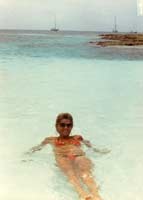
|
The sail from Rocas back to Brazil’s mainland
north east coast, was a fast if not bumpy trip. We
arrived in Fortaleza feeling a little shaken but soon
settled in for a nice stay at the local yacht club,
who on seeing our arrival soon handed out A4 information
sheets, advising use of the club. On the sheet was
an admonition to not use the swimming pool. We were
not alone as a visiting yacht, six more were with
us and most from the HBYC, this was by no prior arrangement
it just worked out that way.
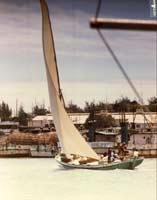 |
Mucruripe, Fortaleza,
Brazil. A traditional Brazilian sailing boat,
they are all enginless and sail like the wind,
check how close winded the boat can sail. |
Collectively we had many children and the sight of
a pool full of water but with no one in it as a banned
swim pool was doing them no good at all. On discussing
the matter with the manager, we found out the ban
went back a year or so when a French yachtsman decided
to take his sails into the pool and wash them, he
himself being quite naked. The members of course objected,
hence the rule which in our case was then lifted and
all was well - that was until a French yacht anchored
and the rules were re applied!
| Tea Time for Janet, |

|
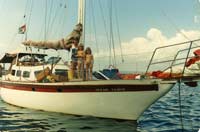 |
A young Janet
with one of her friends |
From Fortaleza, which is the port most east on the
coast of Brazil, we sailed on north toward Sao Luis,
which is a port once significant but heavy silting
has long since closed the general shipping down and
only large tankers can now lay to terminals built
specially for them. The place is full of very interesting
people. The old city is quite Italian in style, pure
sailing vessels ply the rivers working the very fast
tides caused by a seven meter tide, we had to anchor
in plus eight meters to be safe.
| Lorna at a Brazilian
family braai we were invited to in Fortaleza.
All the South African cruisers were invited, we
were so many, seven yachts ,that we collectively
rented a Mercedes Bus to get us all to the event.
|
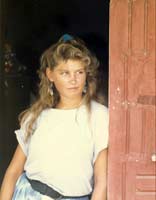
|
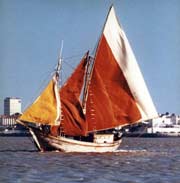 |
The art of tacking
when it really matters! Just outside of the
old port, Sao Luis, Brazil |
As a family we had a nice if not overlong stay in
Sao Luis, waiting for expected mail that just never
arrived. The Commodore of the yacht club -Clube
de Reggata- bought a large leather bound visitors
book and asked Lorna to do the first entry. This was
a nice family sailing club, as many are in Brazil.
| Prize giving at
the Clube de Reggata; that’s the
Commodore handing out the prizes and just look
at the size of them! |
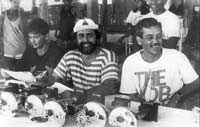
|
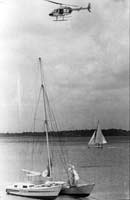 |
All sailing
is done right of the beach at this club, the
massive tides mean no keel boats that can not
be trailered down to the water, multihulls are
favourite for obvious reasons. |
Leaving our by now lost mail behind, we sailed out
on a flood tide,10 knots over the ground by what was
then a Walker 412 SatNav. Remember those days! The
sailing was easy and fast, the current was moving
us along at 170 miles a day. We passed the Amazon
River around 120 miles out to sea. Our next destination
was to be that place of legend, Devils Island. We
had the most easy passage on this trip and we eyeballed
the group of three Islands as we arrived, then saw
them disappear from view in the one and only rainstorm
we encountered on that leg of the sea; sods laws at
play I assume?
| Fishing along our
route:
Where ever we sailed, fishing for supper was
a part of what we did. Often the lure would
just vanish by being taken by large fish which
we never saw. This Tuna is just the right size.
With refrigeration aboard we could then stop
fishing until the need to catch more. |
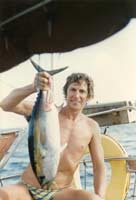
|
|
|
| Devils Island itself, is in
fact not in this picture; we are looking from
the seaward side to Royale, then St Joseph Islands.
The notorious Devils Island is just out of the
picture to the left.
Picture by G Delabegerie |
The best anchorage is just off St Joseph, on the
inside, some use a of a rolly anchorage may be made
on the inside of Royale but its not to be recommended
as the open channel to the North (left) brings in
a swell and current.
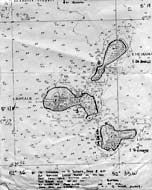 |
A faded copy
of the only chart we ever found, at some 52.35w
and 05.17n we had now sailed some 4658 nautical
miles from our Cape Town home. The indicated
three anchors of St Joseph mark the best place
to stop. |
The main buildings that can be seen on the islands,
are the old hospital and officers quarters which is
now a boutique hotel. No water exists on any of the
islands, you have to sail to the mainland and Korru,
to fill up there.
| DEVILS ISLAND! This
is the missing island from the previous picture
and taken from St Joseph Isle. |
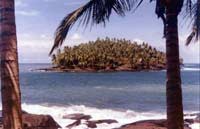
|
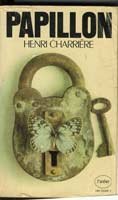 |
THE
BOOK THAT STARTED IT ALL.
THAT STARTED IT ALL.
By Panther Books,1970
Also as a movie with Dustin Hoffman as the lead
role. with Dustin Hoffman as the lead
role. |
The island was, as most people know, a prison island
of some repute, if that’s the correct term.
The story ‘Papillion’ by Henri Charriere,
told the tale of the living hell the inmates went
through. I can tell you that anyone who has watched
the movie has seen exactly what the place looked like.
The film set used, was a perfect copy of the real
thing. We had the surreal experience of one of the
fellow cruising yachts having the movie “Papillon”
aboard his yacht. The soundtrack was in German but
one evening we all went ashore, invited by the French
Gendarmes, to watch the movie in their barracks on
St Joseph. It was a most goose tingling experience
knowing that the very buildings and people we were
seeing enacted out in film, had happened for real,
just yards from the front door!
Today, the main prison, which was on St Joseph has
been taken over by massive tropical growth roofs are
either gone or falling in but the guards over head
Iron grate catwalks are still as solid as ever.
| Sonia Notman off
the Cape Town yacht JACANA, a Fortuna 37, standing
at the entrance to one of the buildings.
This photo and those that follow by Alec Notman |
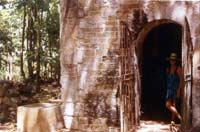
|
The main island of Royale was the place of residence
for the warders and management to the prison, quite
a grand place in comparison to the other islands.
The hospital was on Royale too.
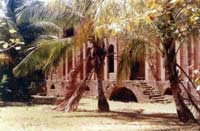 |
The entrance
to the hospital. We saw evidence of a major
attempt to repair the building. A new roof was
in place but the building was generally open.
|
These drawings are on the walls of the Hospital:
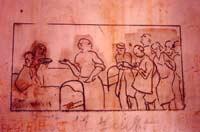 |
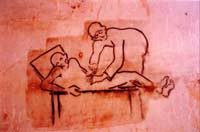
|
| The horror of medicine
back then, may be seen in these pictures. One
can only imagine what is being worked on, The
patient is naked, the doctor clothed. |
| We eventually sailed
on and this is ‘Ocean Cloud’. Janet
and Jean sailing one day into Venezuela’s
Punta Pargo, which is just a day sail away from
Trinidad, West Indies. |
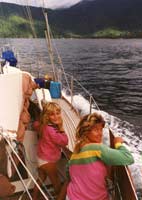
|
Except when mentioned All words and pictures
are by the Mc Bride family
Roy Mc Bride
Yacht ‘Flying Cloud’ (Dix 43)
Hout Bay
South Africa
Copyright, no portion to used without consent
of the writer or family.

|